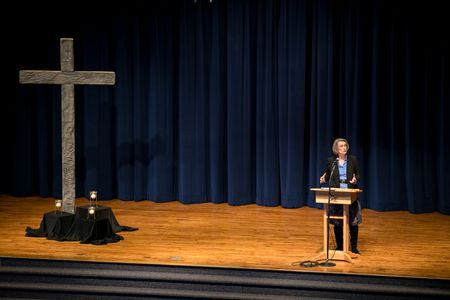News of the extended network of faculty, alumni, students, visiting researchers, and mission partners is regularly updated, and some of the big ideas or major events in Global Christianity are covered in the CGCM News.
Dr. Fohle Lygunda visits the CGCM

The CGMC was delighted by the visit of Rev. Dr. Fohle Lygunda, Head of the Department of Missiology at International Leadership University (ILU) - Burundi, on June 14. Dr. Lygunda and Dr. Dana Robert discussed a possible collaboration for the Dictionary of African Christian Biography (DACB), which was transferred to Boston University in 2012. Dr. Lygunda previously worked as a Project Luke Fellow for the DACB at Overseas Ministries Study Center (OMSC) in New Haven, CT. He also wrote an article on Central Africa for the Atlas of Global Christianity: 1910-2010. Under his leadership, ILU-Burundi launched a master's program in Missiology, in which doctoral student Daewon Moon has served as a visiting lecturer since 2012.
Global Christian Shifts
Dr. Todd Johnson and doctoral student Gina Zurlo published a summary of the main findings of a 2013 update to the Atlas of Global Christianity for the Lausanne Global Analysis, entitled "Highlights of Christianity in its Global Context, 1970-2020: Society, Religion, and Mission." In it they emphasize that Christians today find themselves in very different contexts than 40 years ago and they note that fundamental shifts in the demographics of global Christianity are continuing. The full article can be accessed through The Center for the Study of Global Christianity website at Gordon-Conwell Theological Seminary.
New Photo from Eastern Mennonite U. Lectures
Thanks to EMU for permission to post it!
Lisa Beth White on BUniverse!
Rev. Lisa Beth White's lecture "How to Lead a Mission Trip" is now online at BUniverse!
A Message from Ted Karpf
CGCM Colleagues
For two years I have been working to bring a new course based on missions work in the HIV/AIDS to STH. This spring it has happened. The advert is below. More importantly, this is the first course with a critical international public health component and one which is field tested in missions round the world. Values and practices is based on my foundational work with the Ford Foundation and WHO on Decent Care. It will look at health and health systems and give a sense of how to understand what is happening in systems and what can change for the patient and family in that system. By enacting agency every one of us can be the manager of our own health care. For those of us in missions it is crucial to understand how each of us can have a say in what happens to people in health care encounters. The course will be driven the class itself with reasonable reading assignments and paper by midterm. The final will be the writing of an Op Ed piece, max 750 words. That should lighten the end of year issues, all to be done before finals week. Cannot figure out how to do this any better. It is a first-run course and we will learn from each other how best to make this work. So I hope you will consider signing up.
Best Always
Ted+
 Course Description
Course Description
Important theoretical and practical issues related to cross-cultural, governmental and nongovernmental and faith-based service work related to the practice of *Decent Care and its application in developing healthy communities will be surveyed.
Structured according a developmental approach to health and health systems, students will be encouraged to think critically about and experience the application of values and assumptions undergirding health systems and structures of such service work as currently envisioned and practiced.
Case studies, guest speakers, and multimedia offerings will enrich the context of informed disciplinary and cross disciplinary approaches.
*Decent Care is a concept developed in the World Health Organization by the instructor. Decent Care bases the planning, delivery and evaluation of care on values that place individuals, in their social and cultural contexts, at the center of the caring process. The aims of decent care are to develop health systems around the primacy of persons in their own health care, and to build a bridge between the principles of human rights and the practice of medicine. By listening to and honoring the voices of the people care processes and models can be developed that respond to the needs of a community enabling human flourishing.
Music and Mission
 Tracy Howe Wispelwey, a long-time singer and songwriter, visited the BUSTH on May 2, shared her journey, her vision for art and music being a restorative force in the world, and some of her songs. Psalm 126 has been particularly important to her. "It is how transformation happens," she said. "You do this and I will be there (not it will happen)." She likes to collaborate. In recent years she has worked closely with groups of people in many local contexts, particularly in Latin America. You can listen, download, or share some of Tracey's music here.
Tracy Howe Wispelwey, a long-time singer and songwriter, visited the BUSTH on May 2, shared her journey, her vision for art and music being a restorative force in the world, and some of her songs. Psalm 126 has been particularly important to her. "It is how transformation happens," she said. "You do this and I will be there (not it will happen)." She likes to collaborate. In recent years she has worked closely with groups of people in many local contexts, particularly in Latin America. You can listen, download, or share some of Tracey's music here.
Rev. Don Woolley on the Missional Church
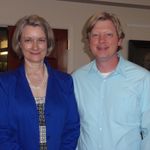
Rev. Don Woolley, an Alabama pastor and leading activist in the movement to make the church a movement again, visited BUSTH on April 24 and 25 to talk with faculty, administrators, students, and Conference leaders of the local UMC about forming missional churches. A response to the end of Christendom, the purpose is to reorient the church from a bunker, deficit mentality to an external focus taking the Gospel out into the world."There is a difference between reaching out to the community because you need them to survive and reaching out because the community needs Jesus," said Woolley in his Thursday lecture.
Rev. Woolley is working closely with the Australian Alan Hirsch, founder of Forge International and Forge America, its spin-off in the U.S. Forge does domestic missionary training that is fully grounded in Scripture, something they believe churches forgot because of their status during the seventeen hundred years of Christendom. Their inspiration, rather, is the pre-Constantinian Early Christian Church where Christians took Jesus very seriously in spite of the radical implications of the gospel. They denied themselves. They loved others. Women had authority. And they grew hugely, even though they were illegal and the price of becoming a Christian might be death.
A lively discussion ensued about the differences between the church growth model, which Rev. Woolley feels is basically consumer driven and seems to be running out of steam, and the missional model he, Hirsch, and Forge are advancing.
Spring 2013 Newsletter is Here!
The CGCM Spring newsletter is done and available here. Check it out!
Korean Diaspora Progress Reported
The team of researchers who have been working to construct the ground floor of a project to understand the establishment and growth of the Korean Diaspora community in Boston in the 1950s and 1960s presented the results of their work to date at CURA, the Institute for Culture, Religion and World Affairs on April 8.
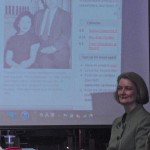
Dr. Dana Robert introduced the project and briefly described a meeting with Dr. Hesung Koh who helped inspire it and advanced a working relationship between the Center for Global Christianity and Mission and the East Rock Institute which is located in New Haven, CT and is one of the oldest and most important Korean culture institute.
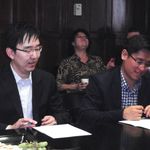 Daewon Moon talked about the Korean Society of Boston and the first Korean church of Boston, both founded in 1953 and how they contributed to promoting Korean Studies at the universities in the Boston area.
Daewon Moon talked about the Korean Society of Boston and the first Korean church of Boston, both founded in 1953 and how they contributed to promoting Korean Studies at the universities in the Boston area.
Hye Jin Lee talked about Sungha Kim, a Korean BU alum, who made huge contributions to the development of the Korean Collection at the Harvard-Yenching Library.
Dr. Doug Tzan talked about the methodological issues involved in the project. 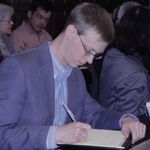
A diverse group of scholars from different parts of the BU community assembled to hear the presentation, ask questions, offer advice, and commit to helping advance the project to the next level.
East Rock Institute Newsletter
East Rock Institute is our partner in this project.
Here is the latest newsletter.
This newsletter includes an article by Hye Jin Lee about the project on page 6 but a link to the entire newsletter is included here for readers who want to get better acquainted with this organization.
